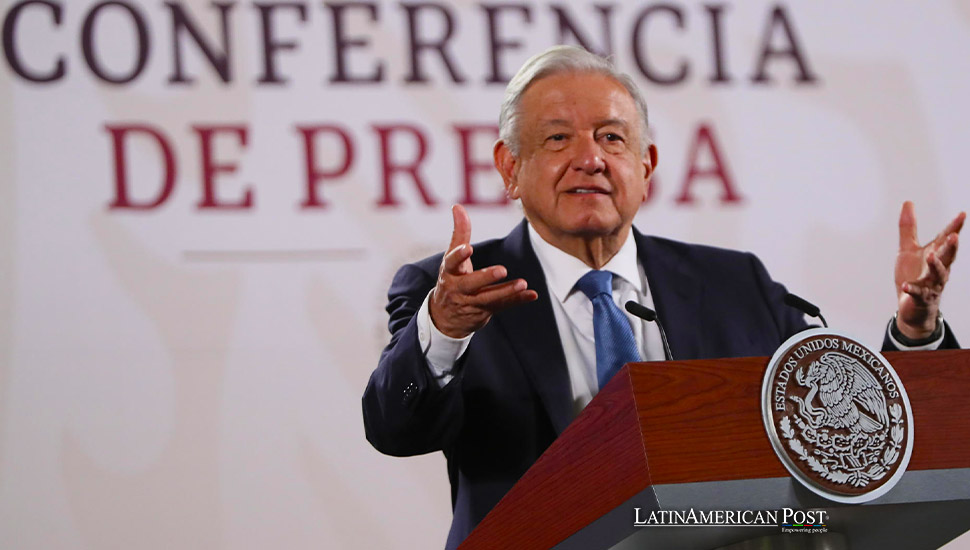AMLO Downplays Border Wall as Unlikely Threat to Mexico

Mexican President Andrés Manuel López Obrador (AMLO) dismisses the likelihood of a U.S.-Mexico border wall under a potential Trump second term, arguing that the project lacks traction. This stance highlights broader implications for Latin America amidst U.S. immigration policy debates.
A Controversial Proposal with Limited Progress
President Andrés Manuel López Obrador (AMLO) firmly asserted Mexico’s status as a free, sovereign nation, emphasizing that it is not a colony of any foreign country. This declaration came in response to the ongoing exchange of immigration policies among U.S. presidential candidates ahead of the November election.
On one side of the debate, Democratic candidate Kamala Harris advocates for a more regulated approach to immigration, proposing worker visas and programs for asylum and refuge. In contrast, her Republican opponent, former President Donald Trump, reiterates his hardline stance, calling for the construction of a border wall between the two nations, increased deportations, economic sanctions, and heightened surveillance along the U.S.-Mexico border.
However, AMLO was quick to respond, rejecting these proposals with an unwavering message: “We do not want walls, we do not want militarization of the border, and we do not want our people to be mistreated. Remember, Mexico is a free, independent, and sovereign country. We are not a colony of any foreign nation.”
AMLO’s statement not only defends Mexico’s sovereignty but also reminds us of the complex dynamics at play between the United States and Mexico, especially as U.S. candidates seek to leverage immigration as a key issue in their campaigns. His message underscores Mexico’s determination to assert its autonomy in the face of external pressures and highlights the broader implications for U.S.-Mexico relations as the election approaches.
Also, AMLO’s confidence that the wall will not come to fruition rests on these past failures. During his presidency, he repeatedly opposed the wall and focused instead on diplomacy and regional cooperation to address migration issues. His administration worked closely with the U.S. on initiatives like the “Remain in Mexico” policy, which, despite its controversy, demonstrated a willingness to engage in more pragmatic solutions rather than confrontational posturing.
Implications for Mexico and Latin America
AMLO’s downplaying of the border wall is significant for Mexico and the broader Latin American region. The U.S.-Mexico border is a focal point for immigration from Central and South America, with thousands of migrants from countries like Honduras, Guatemala, and El Salvador making the perilous journey north each year. A U.S. administration focused on building a physical barrier could increase tensions and complicate migration flows. However, AMLO’s stance suggests that the region should not be overly concerned with this possibility.
Instead, Latin American countries are likely to continue prioritizing internal issues and regional cooperation over the border wall debate. The economic and social challenges exacerbated by the COVID-19 pandemic and ongoing issues like corruption, violence, and climate change demand immediate attention. For countries in Central America, addressing the root causes of migration—poverty, lack of opportunities, and insecurity—remains a more pressing concern than the potential construction of a border wall.
The U.S. Election and Its Limited Impact on Latin America
The rhetoric surrounding the U.S. election, particularly from candidates like Trump, often sparks concern in Latin America, where U.S. foreign policy has historically had significant repercussions. However, AMLO’s approach highlights a growing sentiment that much of the political discourse around the border wall may be more symbolic than substantive. While a potent symbol in U.S. politics, the wall has had limited impact on the ground and is unlikely to fundamentally alter migration patterns or U.S.-Mexico relations in the long term.
For the rest of Latin America, the focus remains on broader U.S. immigration policies rather than the wall itself. Proposals from other candidates, like Kamala Harris’s emphasis on visa regulation, asylum programs, and economic aid to Central America, are seen as more impactful. These initiatives align more closely with the needs of Latin American countries grappling with migration crises and the need for sustainable development.
AMLO’s Domestic Audience: Reaffirming Sovereignty
AMLO’s rhetoric around the border wall also serves a domestic purpose. By reiterating that Mexico is a “free, independent, and sovereign country,” he appeals to a sense of national pride and autonomy. This message resonates with many Mexicans who view U.S. attempts to dictate border policy as an infringement on Mexico’s sovereignty. AMLO’s stance allows him to position himself as a defender of Mexican interests, particularly in the face of what many see as external pressure from the U.S.
Moreover, AMLO’s emphasis on the contributions of Mexican migrants abroad, mainly through remittances, underscores the importance of these communities to Mexico’s economy and social fabric. With remittances reaching nearly $65 billion annually, they represent a vital source of income for many families and a key driver of economic stability. By defending the rights and dignity of these migrants, AMLO strengthens his domestic support and reinforces Mexico’s position in the broader immigration debate.
Sheinbaum’s Continuity: A Signal for the Future
As AMLO prepares to leave office, his successor, Claudia Sheinbaum, is expected to continue many of his policies, including his approach to U.S.-Mexico relations. During their recent joint tour in Sonora, Sheinbaum echoed AMLO’s sentiments, signaling continuity in Mexico’s stance on the border wall and other vital issues. Her support for constitutional reforms, such as the Plan C initiative, which includes electing judges and Supreme Court ministers by popular vote, further illustrates a commitment to maintaining Mexico’s sovereignty and democratic processes.
For Latin America, Sheinbaum’s anticipated presidency suggests that Mexico will strongly advocate for regional cooperation and independence from U.S. influence. Her administration will likely prioritize internal development and social justice while continuing to engage with the U.S. on migration and other critical issues that align with AMLO’s legacy.
The Wall That May Never Be Built
Ultimately, AMLO’s dismissive attitude towards the U.S. border wall reflects a broader skepticism about its viability and impact. The challenges that prevented the wall from being fully realized during Trump’s first term remain, and it is unlikely that a second attempt would fare much better. For Mexico and the rest of Latin America, the focus is on more pressing issues—economic recovery, social equity, and regional stability—rather than on a project that, despite its symbolic weight, may never reach completion.
Also read: Previously Impenetrable, the Darién Gap is Now a Perilous Path for Migrants
As the U.S. election approaches, Latin American countries will continue to monitor developments, but with a clear understanding that the border wall is just one element of a much larger and more complex relationship with the United States. AMLO’s stance serves as a reminder that while U.S. policies can have significant implications for the region, they do not dictate Latin America’s destiny. The region’s future will be shaped by its actions, priorities, and leadership, with or without the shadow of a border wall.





